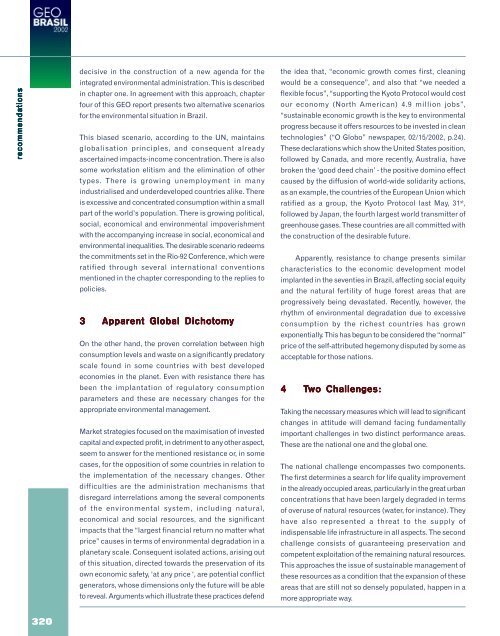GEO Brasil - UNEP
GEO Brasil - UNEP
GEO Brasil - UNEP
You also want an ePaper? Increase the reach of your titles
YUMPU automatically turns print PDFs into web optimized ePapers that Google loves.
ecommendations<br />
decisive in the construction of a new agenda for the<br />
integrated environmental administration. This is described<br />
in chapter one. In agreement with this approach, chapter<br />
four of this <strong>GEO</strong> report presents two alternative scenarios<br />
for the environmental situation in Brazil.<br />
This biased scenario, according to the UN, maintains<br />
globalisation principles, and consequent already<br />
ascertained impacts-income concentration. There is also<br />
some workstation elitism and the elimination of other<br />
types. There is growing unemployment in many<br />
industrialised and underdeveloped countries alike. There<br />
is excessive and concentrated consumption within a small<br />
part of the world’s population. There is growing political,<br />
social, economical and environmental impoverishment<br />
with the accompanying increase in social, economical and<br />
environmental inequalities. The desirable scenario redeems<br />
the commitments set in the Rio-92 Conference, which were<br />
ratified through several international conventions<br />
mentioned in the chapter corresponding to the replies to<br />
policies.<br />
3 Apparent Global Dichotomy<br />
On the other hand, the proven correlation between high<br />
consumption levels and waste on a significantly predatory<br />
scale found in some countries with best developed<br />
economies in the planet. Even with resistance there has<br />
been the implantation of regulatory consumption<br />
parameters and these are necessary changes for the<br />
appropriate environmental management.<br />
Market strategies focused on the maximisation of invested<br />
capital and expected profit, in detriment to any other aspect,<br />
seem to answer for the mentioned resistance or, in some<br />
cases, for the opposition of some countries in relation to<br />
the implementation of the necessary changes. Other<br />
difficulties are the administration mechanisms that<br />
disregard interrelations among the several components<br />
of the environmental system, including natural,<br />
economical and social resources, and the significant<br />
impacts that the “largest financial return no matter what<br />
price” causes in terms of environmental degradation in a<br />
planetary scale. Consequent isolated actions, arising out<br />
of this situation, directed towards the preservation of its<br />
own economic safety, ‘at any price ‘, are potential conflict<br />
generators, whose dimensions only the future will be able<br />
to reveal. Arguments which illustrate these practices defend<br />
the idea that, “economic growth comes first, cleaning<br />
would be a consequence”, and also that “we needed a<br />
flexible focus”, “supporting the Kyoto Protocol would cost<br />
our economy (North American) 4.9 million jobs”,<br />
“sustainable economic growth is the key to environmental<br />
progress because it offers resources to be invested in clean<br />
technologies” (“O Globo” newspaper, 02/15/2002, p.24).<br />
These declarations which show the United States position,<br />
followed by Canada, and more recently, Australia, have<br />
broken the ‘good deed chain’ - the positive domino effect<br />
caused by the diffusion of world-wide solidarity actions,<br />
as an example, the countries of the European Union which<br />
ratified as a group, the Kyoto Protocol last May, 31 st ,<br />
followed by Japan, the fourth largest world transmitter of<br />
greenhouse gases. These countries are all committed with<br />
the construction of the desirable future.<br />
Apparently, resistance to change presents similar<br />
characteristics to the economic development model<br />
implanted in the seventies in Brazil, affecting social equity<br />
and the natural fertility of huge forest areas that are<br />
progressively being devastated. Recently, however, the<br />
rhythm of environmental degradation due to excessive<br />
consumption by the richest countries has grown<br />
exponentially. This has begun to be considered the “normal”<br />
price of the self-attributed hegemony disputed by some as<br />
acceptable for those nations.<br />
4 Two Challenges:<br />
Taking the necessary measures which will lead to significant<br />
changes in attitude will demand facing fundamentally<br />
important challenges in two distinct performance areas.<br />
These are the national one and the global one.<br />
The national challenge encompasses two components.<br />
The first determines a search for life quality improvement<br />
in the already occupied areas, particularly in the great urban<br />
concentrations that have been largely degraded in terms<br />
of overuse of natural resources (water, for instance). They<br />
have also represented a threat to the supply of<br />
indispensable life infrastructure in all aspects. The second<br />
challenge consists of guaranteeing preservation and<br />
competent exploitation of the remaining natural resources.<br />
This approaches the issue of sustainable management of<br />
these resources as a condition that the expansion of these<br />
areas that are still not so densely populated, happen in a<br />
more appropriate way.<br />
320
















